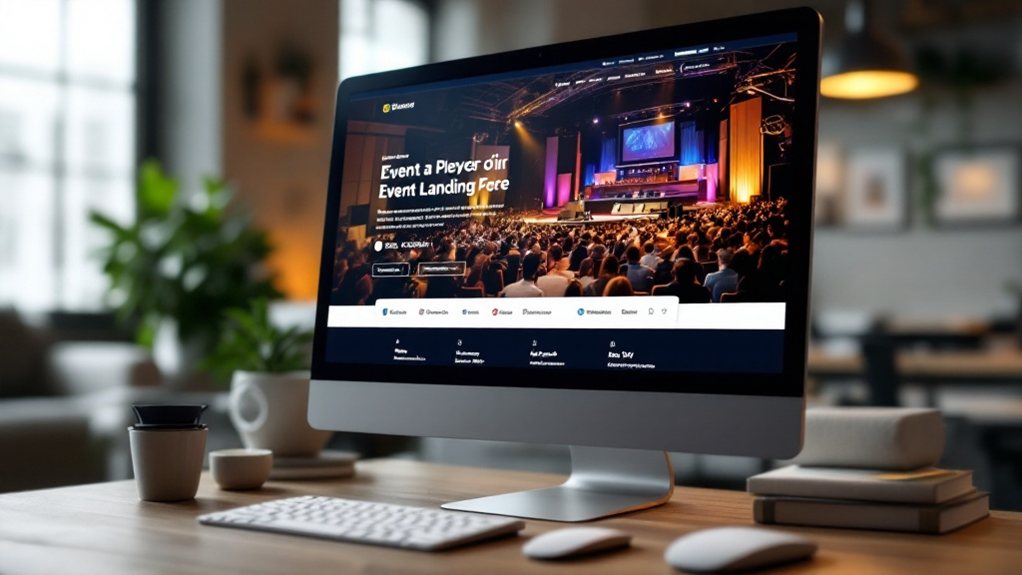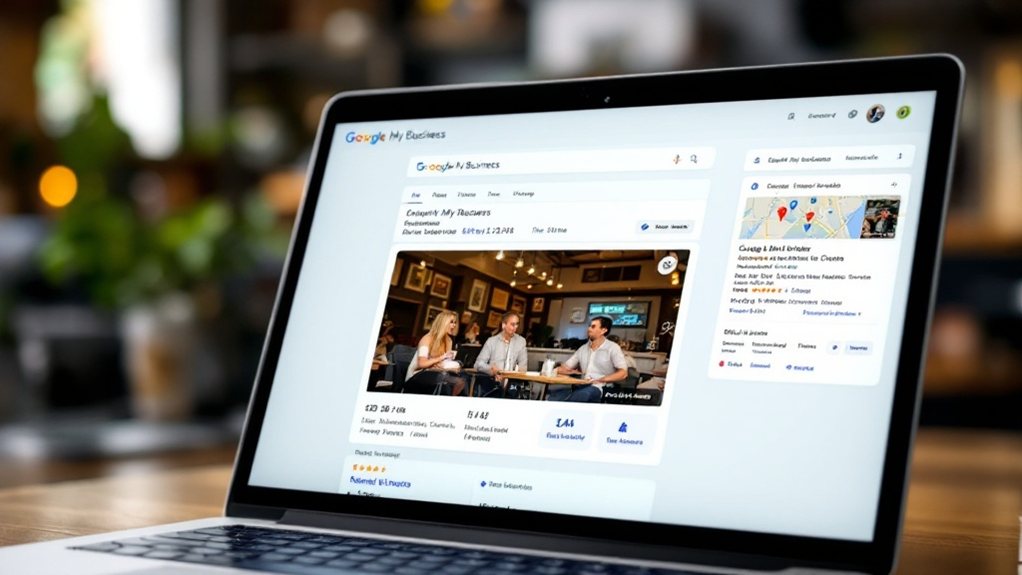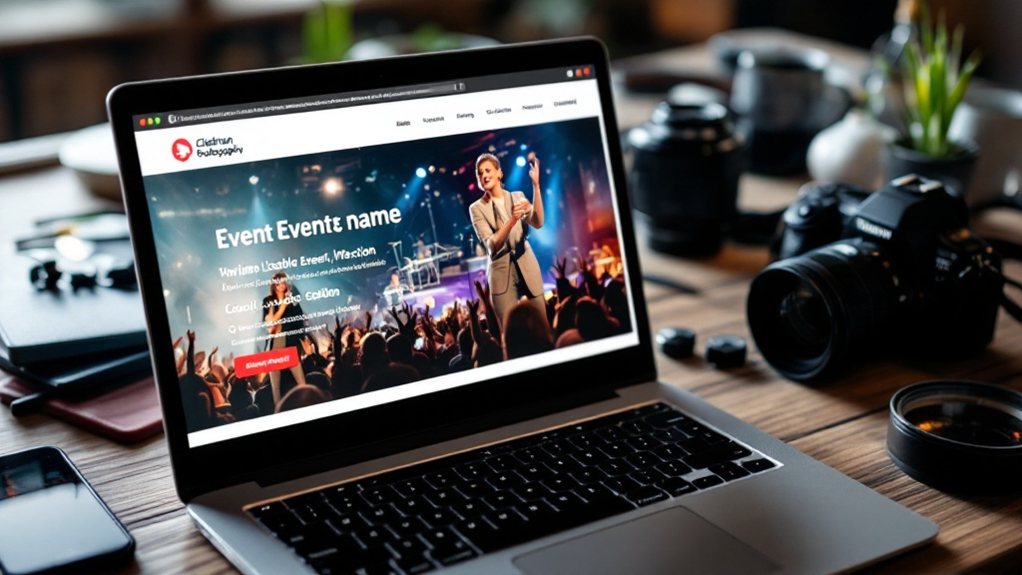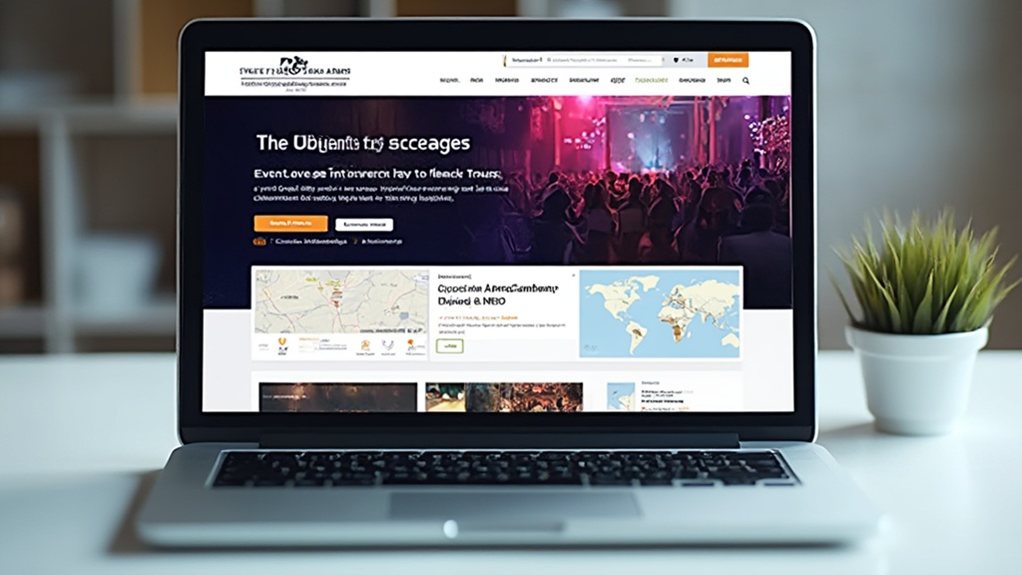To optimize your event landing pages for local search, you'll want to use localized content like images of local landmarks, incorporate regional language, and showcase local testimonials. Leverage Google My Business to promote your events, and ensure your name, address, and phone number (NAP) are consistent across online platforms. Implement structured data to highlight key event details, and optimize your pages for mobile to enhance visibility and engagement. By taking these steps, you'll be well on your way to boosting local search performance.
Localized Content Strategies for Event Landing Pages

Crafting localized content for your event landing pages is key to capturing the attention of your target audience. Feature images of local landmarks or event venues to create a sense of familiarity. Use visuals specific to the event, highlighting key attractions or performers. Incorporate regional language or slang to connect with local audiences on a more personal level. Leveraging local culture and references can strengthen the connection between your brand and the local community. Reference local traditions, customs, or cultural events relevant to your target audience. Highlight collaborations with local businesses or organizations to show community support. Showcase testimonials from local attendees or case studies of successful local events to build credibility. Leveraging these localized strategies will help your event landing pages resonate with your local audience.
Optimizing Google My Business for Event Promotion

While event promotion can take many forms, optimizing your Google My Business (GMB) profile is a crucial component for reaching local audiences. Leverage GMB posts to share details about upcoming seminars, workshops, or product launches. Use engaging visuals, CTAs, and targeted messaging to pique interest. Monitor post performance and adjust your strategy accordingly. Incorporate local keywords, consistent NAP, and prominence signals to enhance local search visibility. Leverage scheduling tools, analytics, and AI-driven content creation to streamline your GMB event promotion efforts.
| Event Promotion on GMB | Key Considerations |
|---|---|
| Content Optimization | Clear, concise event details; use of local/industry keywords |
| Visual Engagement | High-quality images, videos, and CTAs |
| Performance Tracking | Leverage analytics to measure and refine your approach |
| Local SEO Factors | Proximity, relevance, and prominence signals |
Ensuring Consistent NAP Across Online Platforms

Ensuring your business's name, address, and phone number (NAP) is consistent across online platforms is crucial. Consistent NAP data helps build trust and increase the likelihood of converting online visitors. Take the time to audit your listings and promptly update any inconsistencies. Maintaining accurate and uniform NAP details will boost your local search rankings and build trust with potential customers.
Verify NAP Accuracy
Maintaining consistent NAP (Name, Address, Phone number) across online platforms is crucial for optimizing your event landing pages for local search. Conduct a comprehensive audit to identify any inconsistencies in your NAP data. Decide on a standardized format and eliminate any duplicate listings to prevent confusion. Ensure your website's headers and footers clearly display your NAP, and utilize local business schema to enhance its visibility for search engines. NAP audits help identify and fix any inconsistencies in a business's contact information. Regular monitoring and correction of NAP issues using tools like Google Alerts and citation tracking platforms will help you maintain accuracy. Ignoring NAP consistency will reduce your visibility in local search, erode customer trust, and potentially result in ranking penalties.
Update NAP Consistently
Consistently updating your business's name, address, and phone number (NAP) across online platforms is crucial for maintaining a strong local search presence. Consistent NAP builds credibility and enhances local SEO, simplifying customer navigation and ultimately driving more visibility and traffic to your event landing pages. Implement a standardized NAP format and apply it universally. Leverage tools like Yext or Synup to automate NAP management, ensuring immediate updates when details change. Regularly audit your business listings to identify and correct any variations or inconsistencies.
| NAP Management Strategies | ||
|---|---|---|
| Develop a standard NAP format | Apply consistent NAP across platforms | Implement NAP automation tools |
| Regularly audit business listings | Correct NAP discrepancies promptly | Document all NAP information |
Implementing Structured Data for Event Details
Properly implementing structured data for event details is crucial for maximizing the visibility and impact of your event landing pages in local search. Start by including the required properties – 'name', 'startDate', and a unique URL – as well as the appropriate event type based on the format, such as 'OnlineEventAttendanceMode' or 'OfflineEventAttendanceMode'. Incorporate local keywords into the structured data to optimize for local search. Validate your structured data using the Rich Results Test and fix any critical or non-critical errors. Ensure your pages are not blocked by robots.txt and consider submitting a sitemap. Accurately describe event details, avoiding any inaccuracies or mislabeling. Regularly monitor your performance in Search Console and optimize your structured data implementation for continued improvements.
Enhancing Mobile-Friendliness of Event Landing Pages
Ensuring your event landing pages are mobile-friendly is crucial for reaching and engaging your audience. Optimize load speeds by compressing images and prioritizing essential content. Create a simplified, one-directional navigation with a prominent search function and thumb-friendly interfaces. Use clear layouts, ample negative space, and high-contrast colors to enhance visibility and accessibility across devices. Craft effective mobile-friendly CTAs with prominent placement, contrasting colors, and action-oriented text. Leverage mobile-specific features like visual content, interactive elements, and personalization to boost engagement. By focusing on mobile optimization, you'll provide a seamless experience and increase conversions for your event registrations.
Developing Engaging Local Event-Focused Content
When developing engaging local event-focused content, you'll want to prioritize user-friendliness and hyper-local relevance. Tailor your content to be clear, concise, and valuable for local readers. Include neighborhood-specific topics, landmarks, and keywords to improve search relevance. Utilize geo-targeted terms to enhance local visibility. Emphasize community involvement and local support to resonate with your audience. Employ vivid descriptions and compelling narratives to make the content more engaging. Live blogging, social media coverage, and user-generated content can help you capture real-time event experiences. Collaborate with local influencers or media to amplify your event's visibility. [Distribute event materials in high-traffic areas like coffee shops, gyms, and libraries to reach potential attendees.
Leveraging Customer Testimonials and Social Proof
Showcasing positive customer experiences through local testimonials can boost your event's credibility and trustworthiness. Highlighting specific problem-solving or utilizing authentic, location-based visuals can amplify your local relevance. Leveraging social proof tactics, like user-generated content and local influencer partnerships, can further strengthen your event's appeal.
Highlighting Positive Experiences
The credibility and trust of your event are paramount, and you can effectively leverage customer testimonials and social proof to convey the positive experiences of past attendees. Incorporating visuals, such as images or videos, into your testimonials can capture audience attention and evoke authenticity. Displaying reviews from social media platforms, like Facebook or Instagram, further enhances legitimacy. Showcase positive reviews that highlight the unique aspects of your event, as this can encourage doubtful visitors to participate. Featuring user-generated content, such as attendee-created photos or videos, can foster a sense of community and engagement. Lastly, endorsements from influential figures or partnerships with local organizations can reinforce your event's status and increase local visibility.
Amplifying Local Credibility
Building upon the importance of showcasing positive experiences, amplifying your event's local credibility through customer testimonials and social proof is key. Leverage online reviews – viewed by 87% of consumers – as trust signals for both potential attendees and search engines. Strategically integrate diverse testimonials that resonate with your local audience, using structured data to help search engines understand their relevance. Claim and optimize your local business listings, and showcase testimonials across your social media platforms to boost credibility and engagement. By maximizing review visibility and strategically displaying authentic customer feedback, you can significantly enhance your event's local SEO presence.
Crafting Clear Calls-to-Action for Event Registration
Crafting clear calls-to-action (CTAs) for event registration is crucial, as they serve as the guiding beacons that direct potential attendees towards taking the desired action. Position CTAs prominently and use contrasting colors to draw attention. Tailor the language to be action-oriented, and test different CTA variations to determine the best-performing option. Ensure technical optimization for seamless functionality across devices. Create a sense of urgency by indicating limited spots or offering time-sensitive discounts. Leverage visuals and design elements to enhance engagement, and maintain consistency across all marketing channels. Integrate CTAs throughout your event promotion, and continuously monitor and adjust their performance based on data-driven insights.
Applying Local SEO Principles to Improve Visibility
Enhancing your event's local visibility is key. Implement targeted keywords, optimize business listings, and craft localized content strategies. These tactics will help your event land in front of the right local audience.
Targeted Keyword Implementation
When optimizing event landing pages for local search, the implementation of targeted keywords is crucial. Incorporate location-specific keywords into your page titles, meta descriptions, and headings to signal relevance to search engines. Leverage long-tail keywords, such as “[Event Type] in [Location],” to capture more specific search queries. Quality modifiers like “best” or “top” can help refine searches and attract high-quality leads. Ensure that keywords flow naturally within your content to maintain user engagement. Embed location-based phrases in your URLs for clearer search engine understanding. By strategically implementing targeted local keywords, you can improve the visibility of your event landing pages and reach your local audience more effectively.
Optimized Business Listings
Optimized business listings are crucial for improving the visibility of your event landing pages in local search results. Ensure your Name, Address, and Phone Number (NAP) details are consistent across all your listings, including your website, Google Business Profile, and local directories. Regularly audit your listings to correct any inconsistencies, as this helps maintain a strong local SEO presence and enhances customer trust.
To further boost your local visibility, consider these tips:
- Create a verified Google Business Profile to improve your visibility in Google Map Pack results.
- Encourage and respond to reviews to boost local SEO and customer engagement.
- List your business in local directories and citation sites to increase online visibility.
- Optimize your event landing pages for mobile and fast loading speeds to provide a great user experience.
Localized Content Strategies
Crafting localized content strategies is crucial for improving the visibility of your event landing pages in hyper-competitive local search results. Optimize your meta tags and descriptions with relevant local terms to boost SEO. Use tools like Frase to incorporate long-tail, location-specific keywords throughout your content. Adapt your website layout and visuals to suit the cultural norms of your target audience. Highlight local attractions, events, and neighborhood-specific information to engage users. Encourage customer reviews on relevant local platforms and participate in community events to enhance your online presence. Monitor your performance using analytical tools and continuously refine your strategies based on data-driven insights.
Tracking and Analyzing Event Landing Page Performance
How do you track and analyze the performance of your event landing pages? Monitoring key metrics like landing page views, sessions by source, scroll depth, and conversion rate will help you understand what's working and where to improve. Additionally, tracking specific user interactions, such as ticket purchases or form submissions, provides valuable insights into your audience's behavior. To further optimize your landing pages, consider these four strategies:
- Analyze average engagement time and bounce rate to identify content effectiveness.
- Evaluate pages per session to understand how visitors navigate your site.
- Utilize tools like Microsoft Clarity to gain deeper insights into user engagement.
- Monitor cost per conversion to manage your marketing budget effectively.
